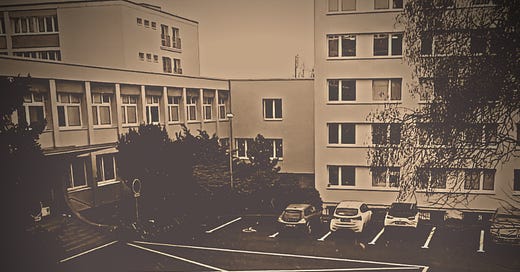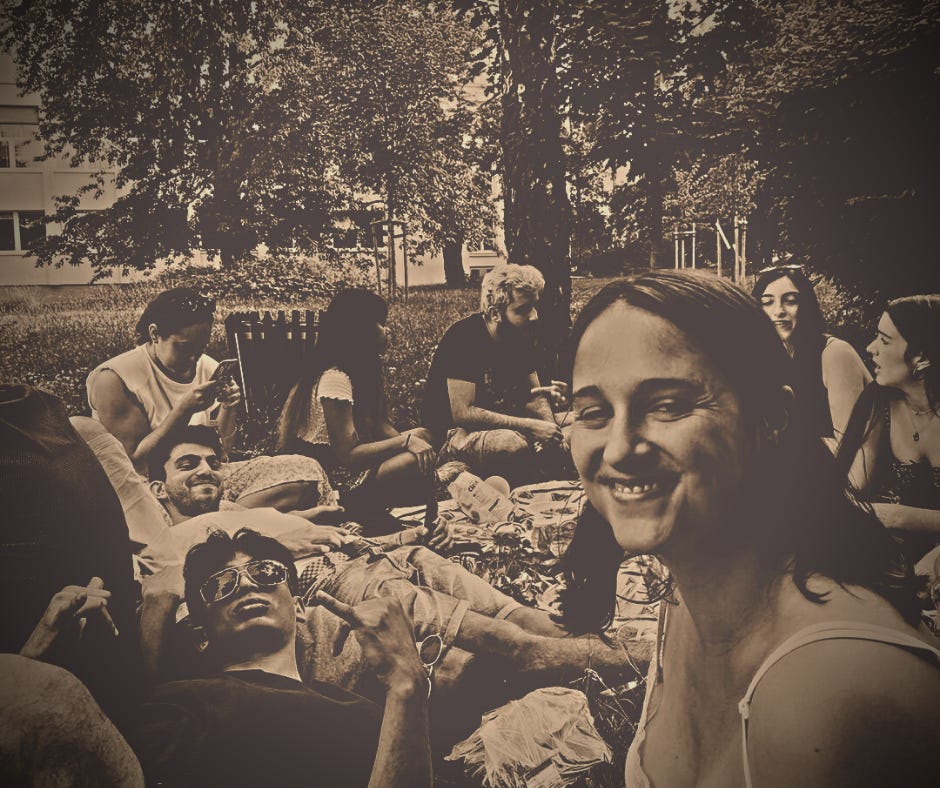A dormitory is a dynamic place. Packed together; people share rooms, kitchens, bathrooms, and recreational spaces. But, they also share some things more phenomenological – time and space; a certain, distinct period of their life. More often than not, when they are young and wild. Nobody wants to live in a dorm for ever. In that way, it’s a transitory space. You have to leave one day.
Many move into apartments if they can while studying – a space of ones own, more amenities and luxuries. But many more choose dormitories, they’re cheaper, more convenient – you don’t have to domestically maintain a house, just maybe clean your room once in a while (advisable to do so). So, when I went abroad for my master’s, I chose to live in a dorm.
***
The dormitory I was assigned to was in Prague 6. Kolej Hvezda. A sprawling building with three blocks, it must have been renovated at least thirty times. It was definitely built during Communist times.
Hvezda was teeming with people from all over. Every continent – and possibly, every subcontinent. Eastern Europe, Western Europe, the Mediterranean, Middle East, North and South America, West Africa, East Asia, South Asia, and all.
There were extroverts, introverts, and everybody in between. Large cliques, intimate duos and trios; everyone would find someone or other to kick it with. If not for anything, just to share smoke, or go grocery shopping together. It was a melting pot; you’d encounter someone from another part of the world, if not in the dormitory’s bar, then while walking the hallway to get your laundry done, or cooking breakfast in the shared kitchen.
There was that burgeoning feeling of community - international brunches and dinners (everyone bringing and sharing their native cuisines); barbeques and movies; WhatsApp groups constantly buzzing with people making plans about a trip here and party there. You’d find yourself travelling Budapest with a huge group of people, you only kind of sort of know, but come to really care for afterward.
I had wild imaginations of how my master’s in Prague (in Europe) would play out. Instead, I got online classes. The Pandemic hit during my second semester and restrictions arose everywhere. Travel, pubs, clubs and restaurants were shut. No groups of more than three people were allowed to congregate. They shut down traffic between the different blocks of Hvezda. Only people who lived in there were allowed.
The pandemic lockdowns were tough for people across the world. Death in droves because of a new, unknown disease; governments balancing and testing the limits of civil liberties and responsibilities; and people having to adjust to a radically different mode of being. Apart from the disease itself, people had to suffer harsh curfews and restrictions, and suffer Isolation. The Pandemic forced a tremendous loneliness upon people. But in Hvezda we had each other. We were lucky.
By vice of being packed together during lockdowns, we were never alone. We contemplated and lived through this apocalyptic event with each other. The Czech Republic kept opening and shutting depending on volume of Covid cases. Life kept pacing and halting. The absurd cycle stretching for months on ends.
The importance of community for people was made evident. For the people in dormitory the restrictions were strange, artificial. In the beginning, people were okay to maybe chill in twos and threes. Then weeks turned into indefinite months, and you just couldn’t. Like moths to a flame, there were people all around you. And The World Was Ending! Slowly people started gathering in bigger groups. Clandestine congregations.
We’d sneak past the receptionists to other blocks. Even they stopped enforcing the draconian rules – when they were in a good mood. The common kitchens once again had communal cooking; then they began hosting games of beer pong. All of a sudden, the common bathrooms became dance floors; lights switched off, dinghy and smoky – just like a grimy club someplace. The police would show up for the noise complaints and the potential break of lockdown restrictions. We’d hide in the rooms. Rinse and repeat.
My friend got kicked out of the dorm for throwing a Halloween party. He was pretty blasé about it though. He moved to the neighbouring dorm, and became a regular visitor. It was a good party too.
***
Covid came to the dorms; it circulate amongst us all sooner or later. Some barely flinched; others had a tough time. One of my friends was on a ventilator for a while. He’s back stronger than ever.
Was it irresponsible? Yes.
Could we stop ourselves? I don’t know.
The impulse to rebel, but also to seek out people, to come together - it’s innate. It felt like an apocalyptic two years; mass deaths, shut borders, curtailed movements. And a whole lot of uncertainty. And there was this dorm, with people in their late teens, 20s and 30s, restless and anxious. We had to come together, we already were together anyways. We were fortunate.
The situation called for isolation but how? People come together in a crisis, they’re wired that way.
I spent two years, not fretting about what’s going to happen, or when it would end. Or, how online classes were the worst - I never got to go to the university for normal classes after my first semester. Instead, I learnt how to stitch my own clothes from my Moldovan neighbour, the importance of siestas from the Spanish, and how to be a beer connoisseur from the Czechs. Coming from India, I got to experience, first-hand, the frustrating fact I already knew - that Pakistanis are as cool as us. Bonds all catalysed in the confines of that Communist-era building.
A dormitory brings people from different places together; it fosters camaraderie.
Kolej Hvezda, Prague 6, is a dynamic place. Most of the people there during the turn of this decade are gone. You have to yield the space for the next batch.







This was very wholesome and relatable! And something felt new and different about the writing style as well